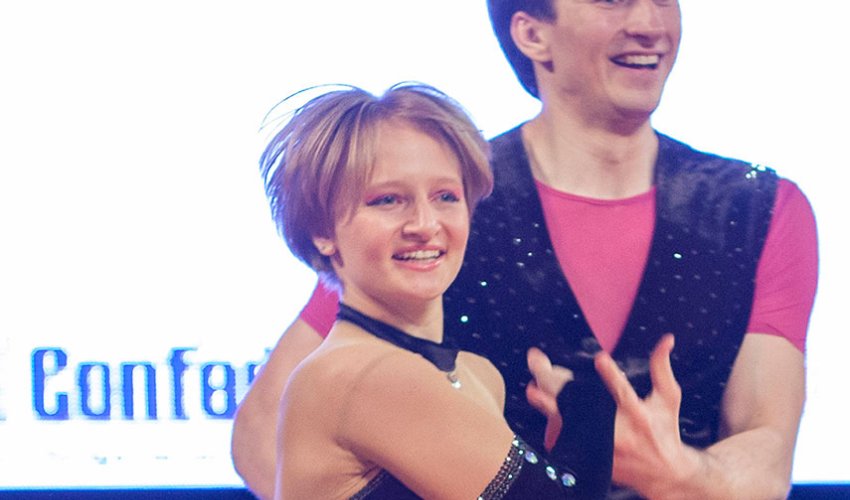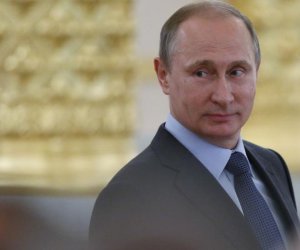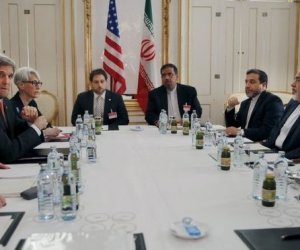Putin’s daughter, a young billionaire and the president’s friends

Since Vladimir Putin began cementing his grip on Russia in the 1990s, many of his friends have grown famously rich.
Not so the president himself, say his supporters, who insist Putin is above the money grab that has marked his reign. His public financial disclosures depict a man of modest means. In April, Putin declared an income for 2014 of 7.65 million roubles ($119,000). He listed the ownership of two modest apartments and a share in a car parking garage.
His daughter Katerina is doing considerably better, supported by some of the Russian president’s wealthy friends, a Reuters examination shows.
After unconfirmed media speculation about Katerina’s identity, a senior Russian figure told Reuters that she uses the surname Tikhonova. Andrey Akimov, deputy chairman of Russian lender Gazprombank, said he had met Katerina when she was little and more recently, and that Tikhonova was Putin’s daughter.
Reuters has also learned that earlier this year Katerina, 29, described herself as the "spouse” of Kirill Shamalov, son of Nikolai Shamalov, a longtime friend of the president. Shamalov senior is a shareholder in Bank Rossiya, which U.S. officials have described as the personal bank of the Russian elite.
As husband and wife, Kirill and Katerina would have corporate holdings worth about $2 billion, according to estimates provided to Reuters by financial analysts. That wealth stems mainly from a large publicly disclosed stake in a major gas and petrochemical company that Kirill acquired from Gennady Timchenko, another longtime friend of Putin.
Also among the young couple’s holdings is a seaside villa in Biarritz, France, estimated to be worth about $3.7 million. That asset, too, was acquired by Kirill from Timchenko, a commodities trader who has known the president since at least the 1990s.
Katerina is also thriving in academia and running publicly funded projects at Moscow State University. A Reuters examination of public documents shows that the president’s younger daughter has signed contracts worth several million dollars from state-owned organisations for work at the university to be carried out by organisations she directs. There is no indication she has made any personal financial gain from this work.
She holds a senior position at the university, and helps direct a $1.7 billion plan to expand its campus. Katerina’s official advisers at Moscow State University include five members of Putin’s inner circle – including two former KGB officers who knew her when she was a toddler. They served with her father in the 1980s when he was deployed to Dresden, East Germany.
Putin’s elder daughter, Maria, is linked to Moscow State University as well. She is a graduate of the school’s Fundamental Medicine Department and is forging a career in endocrinology, according to publicly available documents.
Katerina, Maria and Kirill Shamalov all declined to comment for this article. Asked about the Biarritz home, a spokesman for Timchenko said he would not comment on personal matters.
The stock acquisitions, state business deals, French property and oligarch connections offer a rare glimpse into the lives of Putin’s children. The president has been very protective of his private life and his daughters, who seldom appear in the media. The transactions also provide insight into the family finances of Russia’s most powerful man and the elite that has formed around him.
Katerina and Kirill, 33, are among a new generation of Russians enjoying a rapid rise in the wake of their well-connected parents. The phenomenon bears similarities to the "princelings” of China – the children and grandchildren of Communist Party leaders who have gone on to gain positions of power and amass great wealth.
Olga Kryshtanovskaya, a sociologist and former member of Putin’s United Russia political party, told Reuters that a "new aristocracy” was emerging in politics and state companies, with a second generation inheriting the status of the current circle around Putin. "Many in society think they haven't worked for it, and they question who these people really are,” she said.
Among other children of the Putin circle with growing influence are:
Boris Kovalchuk, son of Yuri Kovalchuk, the largest shareholder of Bank Rossiya and a close Putin associate;
Gleb Frank, son of former transport minister Sergei Frank and son-in-law of commodity billionaire Timchenko;
Igor Rotenberg, son of the billionaire Arkady Rotenberg, Putin’s former judo partner;
Sergei S. Ivanov, son of Kremlin Chief of Staff Sergei B. Ivanov.
(See related story below)
In an interview with Reuters, Alexei Navalny, a Russian opposition leader, described what he called a "neo-feudal system” that threatens to dominate state offices and big business.
"Today in Russia, it is absolutely normal that the boards of directors at state banks are headed by children of security service officials, who aren’t even 30 years old when they are appointed,” he said. "It is more than just a dynastic succession. Children don’t just inherit their parents’ posts, but also the right to choose any other post they fancy. The danger is that very soon all key resources will end up in the hands of five to seven families.”
Reuters asked the Kremlin whether Katerina Tikhonova was the daughter of Putin and whether she is married to Kirill Shamalov, and other questions. Dmitry Peskov, press secretary of the Russian Federation, replied: "We have no information whatsoever about the personal life, family connection, marital status, academic activities, involvement in particular projects and family tree of Ms Tikhonova, or about other individuals mentioned in your letter.
"In recent years there has been an enormous quantity of gossip on the subject of the family ties of V. Putin, and, in particular, his daughters. The proportion of accurate information in all these publications is laughably small.”
"TALENTED RESEARCHER”
Katerina has largely escaped public attention since her father became president in 2000. In 2011, Putin told Russian television that Katerina had read Oriental studies, specialising in Japanese and history, at St. Petersburg University.
Little else was known about her adult life until a Russian blogger, Oleg Kashin, reported in January that the president’s younger daughter was active at Moscow State University and had taken the surname Tikhonova, derived from the name of her grandmother, Yekaterina Tikhonovna Shkrebneva.
As well as Gazprombank’s Akimov, two senior academic sources - one at Moscow State University and one scientist with close contacts there - also confirmed to Reuters that Tikhonova is Putin’s daughter.
She has made rapid progress since her Oriental studies as an undergraduate.
According to the website of Moscow State University, she is attached to the Mechanics and Mathematics Faculty. Under the name Tikhonova, she is listed as an author, along with other academics, of a chapter in a maths text book and at least six scientific papers since 2011. The papers include studies on medicines and space travel; one is listed as a study of how the human body reacts to zero gravity.
Most of the papers were co-authored with the university rector, Viktor Sadovnichy. He did not respond directly to requests for comment, but the university issued a statement.
It said Tikhonova had proved to be a "talented researcher” who had "reported results of her research at scientific seminars and conferences many times.” The statement added: "We do not have information about the private life of employees.”
Tikhonova is also the director of two initiatives connected to the university, the National Intellectual Development Foundation (NIDF) and the National Intellectual Reserve Centre (NIRC). She became director of the non-profit NIDF in May 2013 and later became director of the NIRC as well.
The NIRC and NIDF created and run a project at the university called Innopraktika, which is also headed by Tikhonova. It sponsors and supports young scientists.
Innopraktika has a raft of advisers and partners who are close to Putin, including Sergei Chemezov and Nikolai Tokarev. The two men were KGB associates of Putin during his days as a spy in Dresden, Germany, living in the same apartment block as the future Russian leader and his young family.
Chemezov is now the head of state-owned technology giant Rostec, and Tokarev is head of state-owned Transneft, a gas pipeline company. Tokarev did not respond to a request for comment. Chemezov’s company Rostec said in a statement that Rostec assists in the state’s development of industry, and that Chemezov’s involvement with Innopraktika was therefore "natural and logical.”
Also among the trustees of Innopraktika, according to its website, are Igor Sechin, head of the state oil company Rosneft, and Andrey Akimov, deputy chairman of Gazprombank. Rosneft and Sechin declined to comment.
Asked about Tikhonova and Innopraktika, Akimov told Reuters: "I knew it was Putin’s daughter. But of course we took the decision to support MSU’s projects irrespective of any family connections.” Innopraktika’s programme coincided with the bank’s own priorities, he said, including Gazprombank’s "global idea of supporting scientific development.”
He said he did not believe that Tikhonova had received any special treatment, and that he supported the expansion plan of Moscow State University, regardless of Tikhonova’s involvement.
The university’s rector, Sadovnichy, said in a May 2014 presentation published on the university website that NIDF, along with other entities, would be tasked with conducting an expert review of the expansion of the university. Tikhonova’s role is to confer with and represent the views of the wider business community, she told Interfax in an interview this month.
The $1.7 billion expansion plan involves both public and private funding, and aims to double the size of the university campus by 2018 with new laboratories, academic buildings, schools, student accommodation, and a museum.
The NIDF did not respond to a request for comment. In an email, Innopraktika referred questions about its activities to Moscow State University and said it could not comment on Tikhonova’s private life.
The university said in a statement that many people were involved in its expansion plan, including university employees and outside experts.
According to Russian state public records, since 2013 the NIDF has won contracts worth 182 million roubles ($2.8 million) from Rosneft, Rosatom and Transneft, all state-owned companies. Of 10 contracts reviewed by Reuters, eight were awarded without competitive tender. The contracts were mostly to carry out research at the university.
Transneft declined to comment. A spokesman for Rosatom said: "Rosatom cooperates with Innopraktika as well as other institutions … As part of its strategy Rosatom aims at developing new projects.” He said contracts were awarded openly and transparently.
A spokesman for the oil company Rosneft said it was cooperating with Moscow State University on 17 projects that were worth a total of 530 million roubles.
In March 2015, Tikhonova was appointed as a deputy vice-rector of the university. It is not known whether the post pays a salary. Tikhonova’s role in the expansion project, though not her family tie to Putin, was laid out in a report in January by Russian news agency RBC. Her title at the university was first reported by opposition leader Navalny. Her appointment is noted in an official order by Sadovnichy posted on the university website. She does not appear on the ordinary list of staff, but she is listed as a member of the university’s scientific council.
Asked about Tikhonova’s title, pay and role, the university said in statement: "The National Intellectual Reserve Centre supports specifically young people in innovative activity of MSU, and that is why its activity is coordinated by the Rector’s office … Consequently the Centre’s director Katerina Tikhonova is the deputy vice-rector within this department.”
OCEAN VIEWS
Tikhonova is active beyond the university. Under that name, she has competed for years as an acrobatic rock’n’roll dancer. In 2013, she and her dancing partner came fifth in a world championship event in Switzerland.
Today, she is chairman of two organising committees of the All-Russian Acrobatic Rock’n’Roll Federation, according to its website. The Federation’s sponsors include Sibur, Novatek and Gazprombank - companies that are co-owned or co-controlled by friends and associates of the president. These people include Timchenko; Kirill Shamalov; and Kirill’s elder brother, Yury Shamalov. The same companies are also mentioned on Innopraktika’s website as among its corporate partners.
A spokesman for Sibur said: "As for sponsoring the (Acrobatic Rock’n’Roll) Federation – the motives are the same as in partnerships with other types of sport. At different times Sibur has supported the Russian basketball federation, Formula One team, many Russian hockey and football teams and many others.”
The spokesman said Sibur provided advice but not money to Innopraktika, and had long collaborated with Moscow State University. Novatek did not respond to requests for comment.
News of a possible relationship between Tikhonova and Shamalov surfaced early this year. The RBC agency and Kashin’s blog both reported in January that the two visited Switzerland together.
Reuters has independently confirmed that Tikhonova identified herself as Shamalov’s "spouse” during her visit to Switzerland.
The young Shamalov has a valuable property in France. Perched atop a sea cliff in the resort of Biarritz is a four-storey house with a swimming pool, which Shamalov acquired three years ago.
The elegant house on Avenue du General Mac Croskey in Biarritz covers about 300 square metres inside and has 2,000 square metres of garden. Built in the 1950s, it is now worth about 3.5 million euros ($3.7 million), according to Pierre Fourreau, an architect who renovated the property seven years ago.
(Reuters)
www.ann.az































 Photo
Photo 



 Video
Video 

